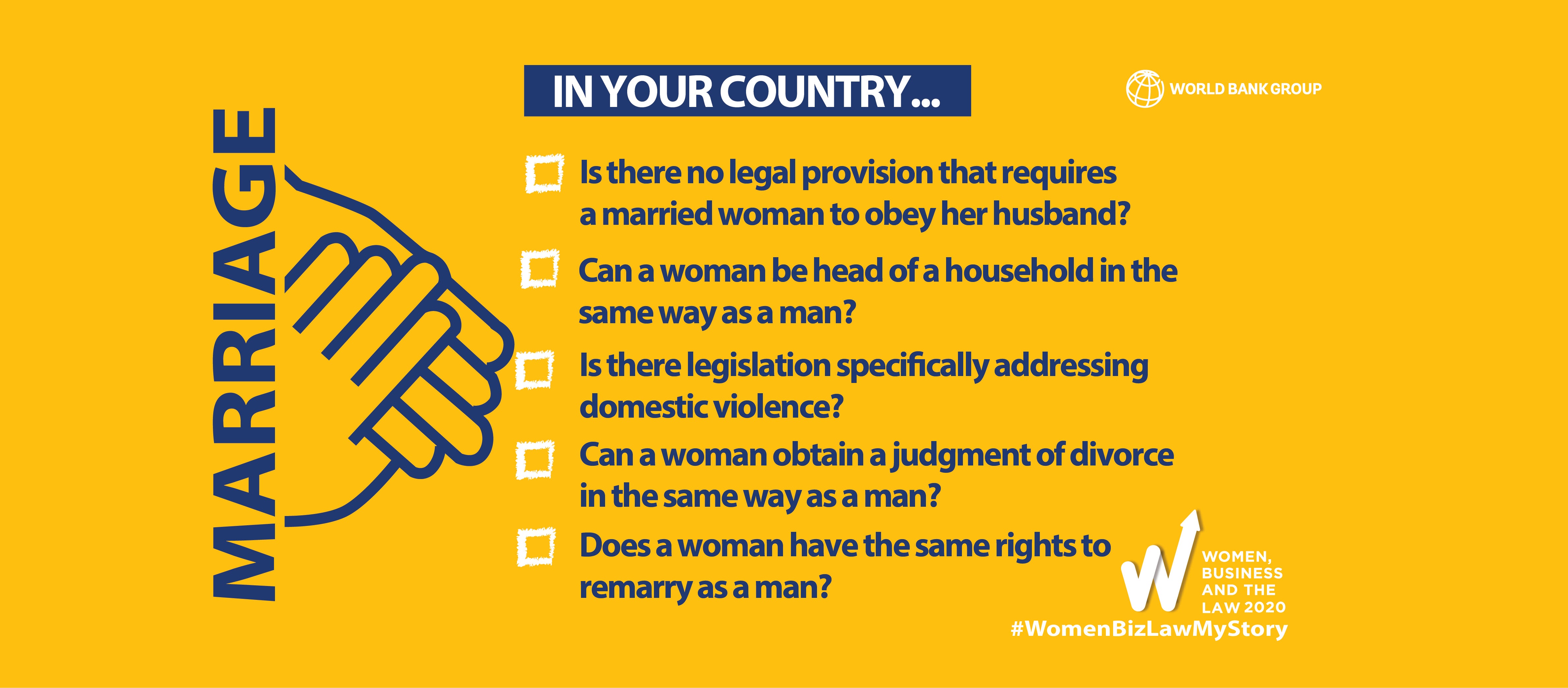 WomenBizLaw Marriage Indicator
WomenBizLaw Marriage Indicator
A new feminist anthem on violence against women is taking the streets of cities on every continent. For many women, the finger points at the person they should trust the most. Crying “the state doesn’t support me, it’s my sisters that do,” they have appealed directly to their governments to do more to confront this epidemic. Their strength in numbers makes the call for change impossible to ignore.
It might surprise you that women still have to protest domestic violence in 2020. But did you know that it’s been just 40 years since the first law on domestic violence was passed? For a long time, family and domestic relations were considered a private matter, something that shouldn’t be subject to external regulation. However, as the feminist movement gained momentum, and more women spoke out about their experiences, many countries took action.
With five decades of data, the Women, Business and the Law project tracks the global progress in enactment of domestic violence legislation over time. Beginning with Ireland in 1981 and peaking during the second half of the 1990s and 2000s, there are now 155 countries worldwide that have such legislation. Over the past two years, eight countries adopted laws on domestic violence for the first time: Armenia, Burkina Faso, Djibouti, Eswatini, Liberia, Morocco, Tunisia, and the United Arab Emirates. Armenia reformed after the European Union conditioned budgetary support on the adoption of a domestic violence law. In Tunisia, the passage of the violence against women law was a victory for women’s rights groups that had been fighting for legal protection since the 1970s.
Though more than 80% of countries provide such legal protection, the numbers are still startling. It has been estimated that 35% of women have experienced physical and/or sexual violence in their lifetime by an intimate partner. Every day, 137 women across the world are murdered by a member of their own family. Women suffering domestic violence are at higher risk of contracting sexually transmitted diseases. Their daughters are more likely to be abused by their partners, and their sons more likely to become abusers themselves.
Preventing and addressing violence is not only fundamental for women’s safety, but it’s also key to economic growth. The negative impact of domestic violence on women’s physical and mental health has repercussions on their performance in the workforce, on firm productivity, and ultimately on a country’s economic development. Not to mention the costs borne by women and their countries due to expenditures on health care and legal, housing, and social services. In fact, the economic cost of domestic violence has been estimated to correspond to about $4.4 trillion, or 5.2%, of global GDP.
Beyond legislation, international evidence shows the effectiveness of protection orders and the availability of shelters in the reduction of gender-based violence. A multisectoral approach to prevention interventions covering different risk factors – social norms, childhood violence, alcoholism, etc. – has also shown positive results. The IMAGE Program in South Africa, for example, combined microfinance training with sessions addressing gender norms, cultural beliefs, and intimate partner violence. The outcome was a positive impact on poverty, gender-based violence, women’s empowerment, and HIV rates.
Women, Business and the Law offers a measure of legal gender equality in the fundamental areas that affect women’s economic opportunity, including their protection from violence. Legislation is the foundational first step toward meaningful implementation and the adoption of additional protection measures and services. Today, 35 countries in every region of the world still lack legislation aimed at protecting women from violence. The data and the facts are loud and clear. Are states going to listen?



Join the Conversation